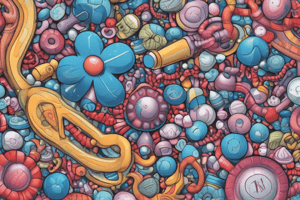Podcast
Questions and Answers
What is a contraindication for SGLT-2 inhibitors?
What is a contraindication for SGLT-2 inhibitors?
- Type 2 diabetes
- High cholesterol
- DKA or type 1 diabetes (correct)
- Hypertension
Which of the following is an adverse effect associated with thiazolidinediones?
Which of the following is an adverse effect associated with thiazolidinediones?
- Upper respiratory infections (correct)
- Dehydration
- Nausea
- Hypoglycemia
What therapeutic action do GLP-1 agonists primarily perform?
What therapeutic action do GLP-1 agonists primarily perform?
- Increase insulin release (correct)
- Increase glucagon release
- Accelerate gastric emptying
- Decrease insulin release
Which drug should not be taken with gemfibrozil?
Which drug should not be taken with gemfibrozil?
What therapy is indicated for the treatment of hypoglycemia?
What therapy is indicated for the treatment of hypoglycemia?
Which class of medications is primarily effective in decreasing insulin resistance?
Which class of medications is primarily effective in decreasing insulin resistance?
What is an important caution when using human amylin?
What is an important caution when using human amylin?
A patient with type 1 diabetes should avoid which therapeutic agents?
A patient with type 1 diabetes should avoid which therapeutic agents?
Which adverse effect is associated with SGLT-2 inhibitors?
Which adverse effect is associated with SGLT-2 inhibitors?
What is the primary indication for GLP-1 agonists?
What is the primary indication for GLP-1 agonists?
What action do glucose-elevating agents perform?
What action do glucose-elevating agents perform?
What precaution should be taken concerning thiazolidinediones?
What precaution should be taken concerning thiazolidinediones?
Which of the following is a major adverse effect of GLP-1 agonists?
Which of the following is a major adverse effect of GLP-1 agonists?
Which of these agents requires monitoring for severe renal impairment before administration?
Which of these agents requires monitoring for severe renal impairment before administration?
Which sign or symptom is commonly associated with hyperglycemia?
Which sign or symptom is commonly associated with hyperglycemia?
What is the primary action of insulin in the body?
What is the primary action of insulin in the body?
In which scenario is the use of sulfonylureas contraindicated?
In which scenario is the use of sulfonylureas contraindicated?
What potential adverse effect can occur from the use of insulin?
What potential adverse effect can occur from the use of insulin?
Which of the following correctly describes the indications for insulin use?
Which of the following correctly describes the indications for insulin use?
What effect do thiazide diuretics have when used with insulin?
What effect do thiazide diuretics have when used with insulin?
What is a main therapeutic action of sulfonylureas?
What is a main therapeutic action of sulfonylureas?
Which of the following is NOT a common symptom of hyperglycemia?
Which of the following is NOT a common symptom of hyperglycemia?
How are sulfonylureas metabolized in the body?
How are sulfonylureas metabolized in the body?
Which statement accurately depicts a caution for using insulin?
Which statement accurately depicts a caution for using insulin?
What advantage do second-generation sulfonylureas have over first-generation sulfonylureas?
What advantage do second-generation sulfonylureas have over first-generation sulfonylureas?
In which scenario would alpha-glucosidase inhibitors be indicated?
In which scenario would alpha-glucosidase inhibitors be indicated?
What is a key therapeutic action of biguanides?
What is a key therapeutic action of biguanides?
What potential adverse effect is associated with the use of biguanides?
What potential adverse effect is associated with the use of biguanides?
Which statement is true regarding DPP-4 inhibitors?
Which statement is true regarding DPP-4 inhibitors?
What is a common side effect associated with meglitinides?
What is a common side effect associated with meglitinides?
Which of the following is a contraindication for using alpha-glucosidase inhibitors?
Which of the following is a contraindication for using alpha-glucosidase inhibitors?
Why should caution be exercised when administering biguanides?
Why should caution be exercised when administering biguanides?
What indicates the need for immediate assessment in a patient taking DPP-4 inhibitors?
What indicates the need for immediate assessment in a patient taking DPP-4 inhibitors?
Which adverse effect is more common with alpha-glucosidase inhibitors?
Which adverse effect is more common with alpha-glucosidase inhibitors?
What is a principal therapeutic action of meglitinides?
What is a principal therapeutic action of meglitinides?
What constitutes a contraindication for DPP-4 inhibitors?
What constitutes a contraindication for DPP-4 inhibitors?
What is a key pharmacokinetic property of biguanides?
What is a key pharmacokinetic property of biguanides?
What should be monitored in patients taking alpha-glucosidase inhibitors?
What should be monitored in patients taking alpha-glucosidase inhibitors?
Flashcards are hidden until you start studying
Study Notes
Gemfibrozil
- Should not be administered with repaglinide
Meglitinide Prototype
- Not specified in text
SGLT-2 Inhibitors
- Block cotransporter system so glucose is not reabsorbed but lost in urine
- Used as an adjunct to diet and exercise to treat Type 2 diabetes
- Research is ongoing regarding benefits and risks in Type 1 diabetes
- Absorbed from the GI tract
- Metabolized in the liver and excreted via kidneys and feces
Contraindications for SGLT-2 Inhibitors
- DKA or type 1 diabetes
- Severe renal impairment
- Second or third trimester of pregnancy
Cautions for SGLT-2 Inhibitors
- Patients should not breast or chestfeed
Adverse Effects of SGLT-2 Inhibitors
- Dehydration and hypotension
- UTIs and genital fungal infections
- DKA
- Canagliflozin:
- Loss of bone density
- Bone fractures
- Lower limb amputation
Drug-Drug Interactions with SGLT-2 Inhibitors
- Medications that enhance metabolism of SGLT-2 inhibitors
Thiazolidinediones
- Decrease insulin resistance in peripheral cells and liver
- Increase responsiveness to insulin
- Used as an adjunct to diet and exercise to lower blood glucose in type 2 diabetes
- Absorbed orally
- Metabolized by the liver and excreted via kidneys and feces
Contraindications for Thiazolidinediones
- Moderate or severe heart failure
Cautions for Thiazolidinediones
- Monitor for changes in liver function
Adverse Effects of Thiazolidinediones
- Upper respiratory infections
- Headaches
- Muscle pains
- Increased total cholesterol
- Rare: hepatic injury
- Rapid weight gain and edema due to fluid retention
Drug-Drug Interactions with Thiazolidinediones
- Insulin
- CYP2C8 inhibitors
Human Amylin
- Slows gastric emptying
- Suppresses glucagon secretion from the liver
- Regulates food intake by modulating appetite
- Used in patients with both type 1 and type 2 diabetes who are also treated with insulin
- Rapid onset of action; peaks in 20 minutes
- Should be injected before each major meal
Contraindications for Human Amylin
- Hypersensitivity
- Gastroparesis
Cautions for Human Amylin
- When starting, insulin dosing should be decreased
Adverse Effects of Human Amylin
- Nausea, vomiting, anorexia, headache, injection site reactions
- Severe hypoglycemia
Drug-Drug Interactions with Human Amylin
- Pramlintide and insulin or other antidiabetic medications
- Absorption of oral medications may be inhibited
- Gastric-slowing medications (e.g., opioids)
GLP-1 Agonists
- Increase insulin release
- Decrease glucagon release
- Slow GI emptying
- Used as an adjunct to diet and exercise for people with type 2 diabetes
- Some are used to reduce the risk of major CV events in people with type 2 diabetes and CV disease
Pharmacokinetics of GLP-1 Agonists
- Most are administered via subcutaneous injection
- Metabolism and excretion vary
Contraindications for GLP-1 Agonists
- Liraglutide and semaglutide: boxed warnings for risk of thyroid C-cell tumors in animals
- Type 1 diabetes or DKA
- Pregnancy and breast or chestfeeding
Adverse Effects of GLP-1 Agonists
- Pancreatitis
- GI effects
Drug-Drug Interactions with GLP-1 Agonists
- Oral medications: effects may be slowed
- Other antidiabetic agents
Glucose-Elevating Agents
- Increase blood glucose levels by decreasing insulin release and accelerating the breakdown of glycogen in the liver to release glucose
- Used in treatment of hypoglycemia
- Rapidly absorbed and widely distributed throughout the body
- Excreted in the urine
Contraindications for Glucose-Elevating Agents
- Diazoxide:
- Known allergies to sulfonamides or thiazides
- Pregnancy
- Glucagon: No adequate studies on pregnancy
Cautions for Glucose-Elevating Agents
- Lactation
- Hepatic dysfunction or CV disease
Adverse Effects of Glucose-Elevating Agents
- Glucagon and dasiglucagon: GI upset, nausea, vomiting
- Diazoxide: vascular effects
Drug-Drug Interactions with Glucose-Elevating Agents
- Diazoxide: thiazide diuretics
- Glucagon and dasiglucagon: oral anticoagulants
Alpha-Glucosidase Inhibitors
- Inhibit alpha-glucosidase, which breaks down glucose for absorption
- Delay absorption of glucose
- Assist in lowering HbA1c levels
- Used in combination with other agents for people whose glucose levels cannot be controlled with a single agent or with diet and exercise alone
Pharmacokinetics of Alpha-Glucosidase Inhibitors
- Absorbed orally at variable amounts
- Acarbose metabolized in the GI tract; miglitol excreted without being metabolized
- Excreted by kidneys
Contraindications for Alpha-Glucosidase Inhibitors
- Known hypersensitivity
- DKA
- GI disorders
- Acarbose: cirrhosis
Cautions for Alpha-Glucosidase Inhibitors
- Renal impairment
Adverse Effects of Alpha-Glucosidase Inhibitors
- GI effects
- Anemia
Drug-Drug Interactions for Alpha-Glucosidase Inhibitors
- Other glucose-lowering agents
- Medications that increase blood glucose
Biguanides
- Decreases production and increases uptake of glucose
- Lowers both basal and postprandial blood glucose levels
- Decreases hepatic glucose production
- Improves insulin sensitivity of peripheral cells
- First-line standard of care for people with type 2 diabetes
Pharmacokinetics of Biguanides
- Absorbed orally
- Not metabolized; excreted primarily in urine
- Absorption and elimination times vary based on type of formulation
Contraindications for Biguanides
- Known hypersensitivity reactions
- Metabolic acidosis
- Severe renal impairment
Cautions for Biguanides
- Hepatic impairment
- Excessive alcohol intake
- Patients not eating/drinking due to surgery
- Patients undergoing radiologic studies with contrast
- Age 65 years or older
- Hypoxic state
Adverse Effects of Biguanides
- Boxed warning: lactic acidosis
- GI side effects
- Dizziness
- Headaches
- Upper respiratory infection
- Taste disturbance
Drug-Drug Interactions with Biguanides
- Alcohol use
- Carbonic anhydrase
- Iodine-containing contrast media
- Check drug interactions before administrating
DPP-4 Inhibitors
- Slow inactivation of incretin hormones
- Increase insulin release
- Lower glucagon secretion
- Used as an adjunct to diet and exercise to lower blood glucose levels in patients with type 2 diabetes
Pharmacokinetics for DPP-4 Inhibitors
- Rapidly absorbed
- Peak effects in 1 to 5 hours
- Metabolism can vary
- Excretion primarily via kidneys
Contraindications for DPP-4 Inhibitors
- DKA or type 1 diabetes
- History of severe hypersensitivity reactions
Cautions for DPP-4 Inhibitors
- Renal impairment
Adverse Effects of DPP-4 Inhibitors
- Most people do not report adverse effects
- Rare: pancreatitis, heart failure, severe arthralgia, hypersensitivity reactions, exfoliative skin conditions
Drug-Drug Interactions for DPP-4 Inhibitors
- Other medications that lower blood glucose
- May be other drug interactions based on individual drug’s metabolism
Meglitinides
- Similar to sulfonylureas
- Used as an adjunct to diet and exercise in treatment of type 2 diabetes
- Rapidly absorbed
- Extensively metabolized by liver
- Quickly eliminated by kidneys
Contraindications for Meglitinides
- Type 1 diabetes or DKA
- Known hypersensitivity
Cautions for Meglitinides
- No studies regarding pregnancy
- Patients should not breast or chestfeed
Adverse Effects of Meglitinides
- Upper respiratory infection
- Headache
- Arthralgia
- Nausea
- Diarrhea
- Hypoglycemia
Drug-Drug Interactions for Meglitinides
- Multiple; check for potential interactions.
Sites of Action of Drugs Used to Treat Diabetes
Insulin
- Promotes the storage of the body’s fuels
- Facilitates the transport of various metabolites and ions across cell membranes
- Simulates the synthesis of glycogen from glucose, of fats from lipids, of proteins from amino acids
- Reacts with specific receptor sites on the cells
Indications for Insulin
- Treatment of Type 1 diabetes mellitus
- Treatment of Type 2 diabetes mellitus in adults who have no response to diet, exercise, and other agents
Pharmacokinetics of Insulin
- Various preparations available: short- and long-term coverage
- Processed within the body like endogenous insulin
- Peak, onset, and duration vary based on preparation
Contraindications for Insulin
- None generally
- Inhaled insulin: People with asthma, COPD, lung cancer or a history or lung cancer
Cautions for Insulin
- Pregnancy and Lactation
Adverse Effects of Insulin
- Hypoglycemia
- Local reactions at injection sites
- Decreased blood potassium levels
Drug-Drug Interactions for Insulin
- Any drug that decreases glucose levels
- Beta-blockers
- Thiazide diuretics or glucocorticoids
- Possible interactions with various herbal therapies
Sulfonylureas
- Stimulate functioning beta cells in pancreatic islets to release insulin
- May improve insulin binding to insulin receptors and increase the number of insulin receptors
- Increase the effect of antidiuretic hormone on renal cells
- Effective only in patients with functioning beta cells
- May lose effectiveness over time
- Second-generation sulfonylureas have several advantages over first-generation drugs
Therapeutic Actions of Sulfonylureas
- Stimulate insulin release from the beta cells in the pancreas
- They improve binding of insulin to insulin receptors
Indications for Sulfonylureas
- Adjunct to diet and exercise to lower blood glucose levels in type 2 diabetes
- Off-label use: Adjunct to insulin and metformin to improve glucose control
Pharmacokinetics of Sulfonylureas
- Rapidly absorbed from the GI tract; undergo hepatic metabolism
- Excreted in the urine
- Glyburide also excreted via bile
- Peak and duration vary with each drug
Contraindications for Sulfonylureas
- Allergy
- Diabetic complications
- Type 1 diabetes
- Pregnancy
Adverse Effects of Sulfonylureas
- Hypoglycemia
- GI distress
- Allergic skin reactions
Drug-Drug Interactions for Sulfonylureas
- Beta-blockers
- Alcohol
- Many herbal therapies
Studying That Suits You
Use AI to generate personalized quizzes and flashcards to suit your learning preferences.





